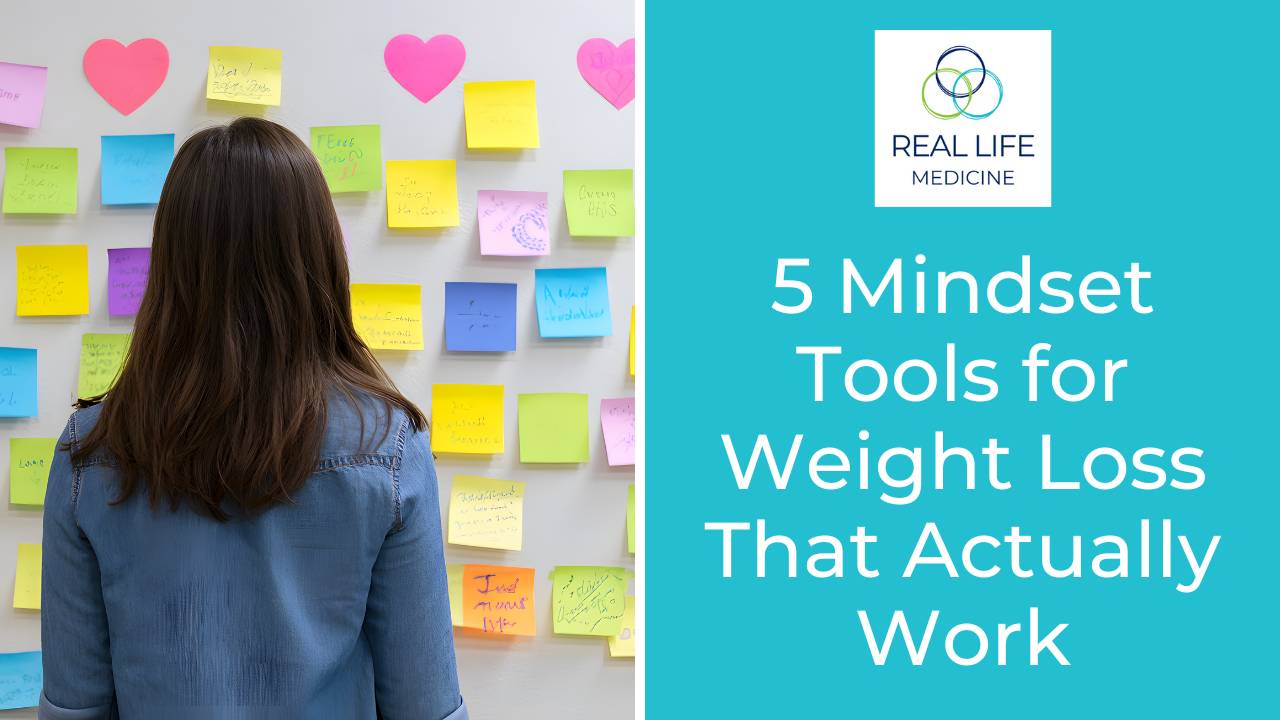
5 Mindset Tools for Weight Loss That Actually Work
Oct 31, 2025When it comes to lasting weight loss, mindset matters more than most people realise. Food, movement, sleep, and stress management are all essential parts of the puzzle — but it’s your mindset that drives your actions every single day, especially when life feels challenging.
If you’ve ever found yourself trapped in cycles of emotional eating, yo-yo dieting, or self-sabotage, it’s not about willpower. It’s about understanding how your mind works — and learning to work with it, rather than against it.
The good news? There are practical, science-backed tools that can help you build that mindset from the inside out.
Real Stories of Transformation
If you’ve ever thought, “I know what to do, but I can’t seem to do it,” you’re not alone. Our podcast dives deeper into these mindset tools and shares real-life transformations that prove lasting change is possible:
-
Episode 274: Do You Self-Sabotage?
-
Episode 215: Three Mindset Tools for Weight Loss
-
Episode 176: Barbara’s Story of Life-Changing Health and Weight Loss
-
Episode 155: Learn More About Self-Soothing — When to Go and When to Slow
-
Episode 21: What Does a Dead Chook Have to Do with Weight Loss?
Every episode offers emotional wisdom, practical tools, and relatable stories that help you stay grounded, motivated, and kind to yourself.
Here’s what the science tells us:
#1. Deep Breathing
Taking slow, conscious breaths in through your nose and out through your mouth calms your nervous system almost instantly. Even one minute can create space for better choices around food, sleep or movement. When your body feels safe, cravings ease and reactive eating subsides.
Example: Instead of diving into the biscuit tin after a stressful day, take five slow breaths. You’ll notice your shoulders drop, your thoughts settle, and the urgency to eat starts to fade. It may sound too good to be true, but your breath really is your body’s built-in tranquiliser - helping you find a pause before reacting.
#2. Tapping (EFT – Emotional Freedom Technique)
This science-backed technique combines gentle tapping on acupressure points with mindful awareness of thoughts and emotions. By tapping on specific points on your face and body while focusing on what’s bothering you, you lower stress hormones and rewire emotional triggers connected to cravings and self-sabotage.
Example: When you feel the urge to raid the pantry because “I’ve blown it anyway,” tapping can interrupt that pattern, calm your body, and help you respond differently. Research shows EFT can be even more effective than cognitive behavioural therapy (CBT) for reducing food cravings.
This is a learnable skill, but it’s best mastered with support. Dr Mary and Dr Lucy teach this inside our Momentum Inner Circle, helping members transform their relationship with food for good.
#3. Hypnosis
Hypnosis helps you enter a relaxed, focused state where deep change is possible. Guided hypnosis quiets the noisy inner critic and reprograms subconscious habits that keep you stuck.
Example: If you find yourself eating mindlessly at night despite your best intentions, hypnosis can help reframe that automatic behaviour - creating calm confidence instead of guilt or shame.
Both Dr Mary and Dr Lucy are medical hypnotherapists, and hypnosis is one of the most powerful, evidence-based tools we use across all our programs.
#4. Journalling
Writing down your thoughts, emotions and experiences is a direct path to self-awareness. Just a few minutes a day helps you notice patterns, explore what’s working, and identify what needs attention.
Example: If you’ve had a tough day and feel drawn to “numb out” with food, jot down what’s going on instead. You might uncover stress, loneliness or fatigue beneath the craving - and that awareness is the first step to change.
#5. Mindful Awareness
Pausing before you eat, taking a few slow breaths, and noticing your hunger, fullness and emotions helps break mindless eating cycles. Mindful awareness connects you to your body rather than old habits, building calm control instead of guilt or denial.
Example: Before reaching for seconds, ask, “Am I actually still hungry, or just looking for comfort?” That small moment of awareness can create powerful shifts - replacing autopilot eating with self-trust.
Real change happens when you have the right support, coaching, and community around you. Inside the Momentum Inner Circle, you’ll learn how to manage cravings, calm your inner critic, and make healthy habits stick for life — no willpower required.
👉 Join the Momentum Inner Circle today!

Dr Mary Barson and Dr Lucy are the founders of Real Life Medicine. They help women who have been on every diet under the sun, optimise their health and achieve long lasting weight loss without feeling miserable or deprived.
They do this with their 3 step framework:
- Strategies to improve your metabolism
- Brain-based skills to overcome self-sabotage
- Tools to make it easy to implement
With this comes increased energy, vitality and confidence.
You can avoid chronic disease and stop living life on the sidelines!

